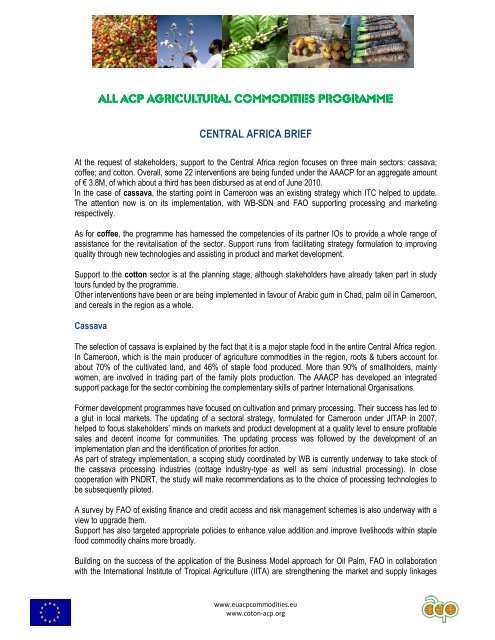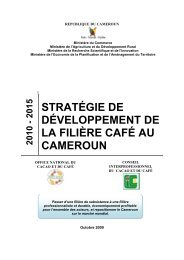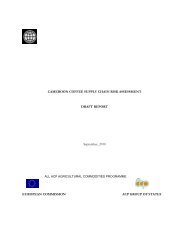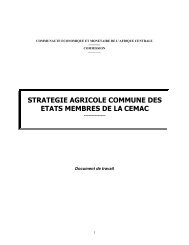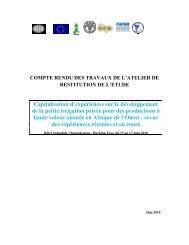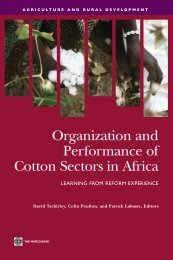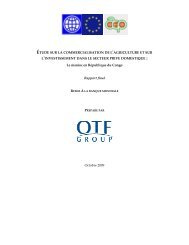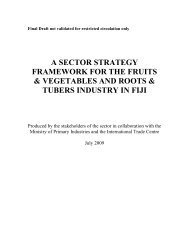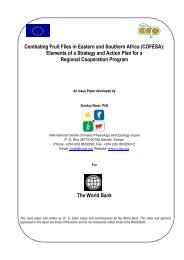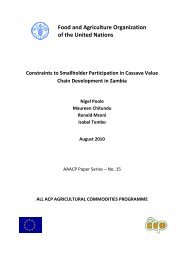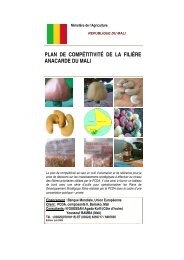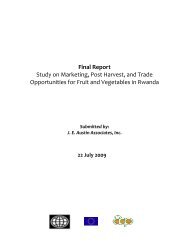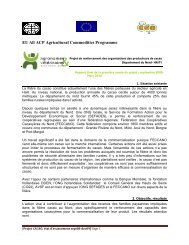All ACP Agricultural Commodities Programme All ACP ... - aaacp
All ACP Agricultural Commodities Programme All ACP ... - aaacp
All ACP Agricultural Commodities Programme All ACP ... - aaacp
Create successful ePaper yourself
Turn your PDF publications into a flip-book with our unique Google optimized e-Paper software.
<strong>All</strong> <strong>ACP</strong> <strong>Agricultural</strong> <strong>Commodities</strong> <strong>Programme</strong>CENTRAL AFRICA BRIEFAt the request of stakeholders, support to the Central Africa region focuses on three main sectors: cassava;coffee; and cotton. Overall, some 22 interventions are being funded under the AA<strong>ACP</strong> for an aggregate amountof € 3.8M, of which about a third has been disbursed as at end of June 2010.In the case of cassava, the starting point in Cameroon was an existing strategy which ITC helped to update.The attention now is on its implementation, with WB-SDN and FAO supporting processing and marketingrespectively.As for coffee, the programme has harnessed the competencies of its partner IOs to provide a whole range ofassistance for the revitalisation of the sector. Support runs from facilitating strategy formulation to improvingquality through new technologies and assisting in product and market development.Support to the cotton sector is at the planning stage, although stakeholders have already taken part in studytours funded by the programme.Other interventions have been or are being implemented in favour of Arabic gum in Chad, palm oil in Cameroon,and cereals in the region as a whole.CassavaThe selection of cassava is explained by the fact that it is a major staple food in the entire Central Africa region.In Cameroon, which is the main producer of agriculture commodities in the region, roots & tubers account forabout 70% of the cultivated land, and 46% of staple food produced. More than 90% of smallholders, mainlywomen, are involved in trading part of the family plots production. The AA<strong>ACP</strong> has developed an integratedsupport package for the sector combining the complementary skills of partner International Organisations.Former development programmes have focused on cultivation and primary processing. Their success has led toa glut in local markets. The updating of a sectoral strategy, formulated for Cameroon under JITAP in 2007,helped to focus stakeholders’ minds on markets and product development at a quality level to ensure profitablesales and decent income for communities. The updating process was followed by the development of animplementation plan and the identification of priorities for action.As part of strategy implementation, a scoping study coordinated by WB is currently underway to take stock ofthe cassava processing industries (cottage industry-type as well as semi industrial processing). In closecooperation with PNDRT, the study will make recommendations as to the choice of processing technologies tobe subsequently piloted.A survey by FAO of existing finance and credit access and risk management schemes is also underway with aview to upgrade them.Support has also targeted appropriate policies to enhance value addition and improve livelihoods within staplefood commodity chains more broadly.Building on the success of the application of the Business Model approach for Oil Palm, FAO in collaborationwith the International Institute of Tropical Agriculture (IITA) are strengthening the market and supply linkageswww.euacpcommodities.euwww.coton-acp.org
etween seven cooperatives involved in cassava production and potential buyers. in the Southern and Easternparts of Cameroon.The results from existing and ongoing market appraisals, including a sub-regional study being carried out by theWorld Bank under the AA<strong>ACP</strong>, are being used to guide cooperatives in the development of business modelstrategies that will reinforce or catalyze market linkages with agro-processors and industrial buyers of raw orsemi-processed produce. Specifically business model activities, which are being implemented by local marketfacilitators, are firstly reviewing the governance structures of the cooperatives, as well as overseeing training incassava-specific agribusiness management topics including marketing, financial, contract and logisticsmanagement as well as training in farm management and production practices to strengthen service provision tomembers.In collaboration with FAO, ITC supports identification and evaluation of regional and international marketopportunities. Joint ventures with major multi-national European importers and industrial users of cassava arecurrently being explored. FAO will also provide assistance in addressing major market obstacles, possiblythrough support to the development of a market information system for cassava and other roots and tuber crops.CoffeeCoffee production in Central Africa has suffered significantly from continuous decline in world prices;discouraged growers turned to other commodities instead. In Cameroon, which is the main coffee producingcountry in the region, production is one third of output in the late eighties.Coffee prices are now improving. In response, the Government of Cameroon has called upon the AA<strong>ACP</strong> tosupport the revival of the sector. The programme has developed an integrated package combining thecomplementary skills of partner International Organizations. Support began with the participatory formulation ofa new strategy, aimed at increasing output and improving quality; modernizing and professionalizing internalmarketing chains; and securing new markets through improved and competitive products.The creation of a coffee exchange was seen as one of possible means to modernize and increase the transparency ofcoffee marketing. UNCTAD guided stakeholders in examining the prerequisites for establishing a commodityexchange and its potential benefits. A Road map will be delivered at the end of the activity. In parallel, it alsocontributed to the setting up of a Market Information hub hosted by National Cocoa and Coffee Board (NCCB).In direct support of the conclusions of the strategy development work, WB-ARMT undertook a risk assessmentof the coffee supply chain identifying the major shocks to the industry caused by changes in public policy andprice volatility. Risk mitigation measures were proposed in a restitution workshop bringing together value-chainstakeholders in Douala.To improve quality, the World Bank is investigating the feasibility of introducing new eco-pulping technologieswhich have been successfully tested in Kenya and Rwanda. These will be tested in small Central WashingStations in four different coffee growing regions of Cameroon. The AA<strong>ACP</strong> will co-finance a comprehensivepackage of services which will ensure that (i) coffee pulping equipments are properly installed in the selectedcoffee cooperatives and (ii) farmer organizations receive proper training in crop husbandry practices to helpthem deliver quality coffee cherries. Equipment is being funded by the “<strong>Programme</strong> d’Appui à la CompétitivitéAgricole – PACA”, a WB value chain programme in Cameroun, thus illustrating the leveraging potential of theAA<strong>ACP</strong>.www.euacpcommodities.euwww.coton-acp.org
ITC complements the foregoing support by focusing on capacity building in export and market development, andguiding local actors on building linkages with regional and international trade fairs and associations. Thus, keysector stakeholders have been introduced to buyers, investors and quality inspectors.To ensure that the benefits of this model approach - characterized by collaboration among and complementarityof partner implementation agencies - are disseminated beyond Cameroon, a dissemination event will beorganized. It will seek to share lessons learned and experiences gained with other countries of the region andabroad.CottonCotton has been confirmed as a strategic activity in Central Africa during the Mid Term Review workshoporganized in May 2009. As in the case of West Africa, actions proposed to support this sector fall within theframework of the EU-Africa Partnership on Cotton which was agreed upon during the Paris forum in 2004, andthe ensuing Action Framework resulting.Interventions in support of the cotton sector in Central Africa will be centred around the definition andimplementation of strategies. The approach is to focus on assisting ECCAS/CEEAC in defining a strategy onhow it can support the development of the sector across the region..www.euacpcommodities.euwww.coton-acp.org


